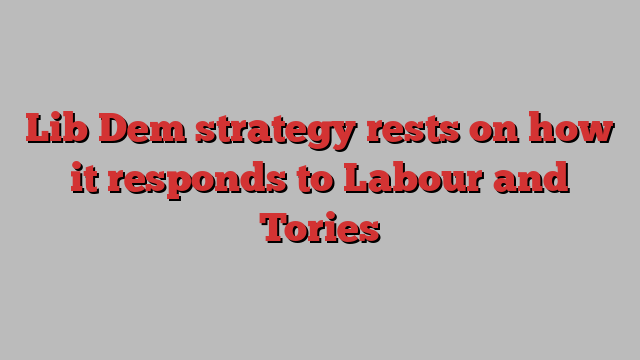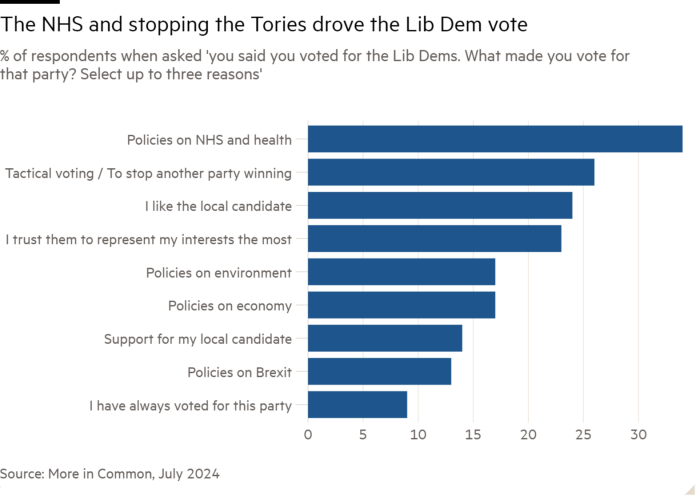
This article is an on-site version of our Inside Politics newsletter. Subscribers can sign up here to get the newsletter delivered every weekday. If you’re not a subscriber, you can still receive the newsletter free for 30 days
Good morning from Brighton, where the Liberal Democrats are meeting for their autumn conference. I am feeling a little the worse for wear having spent much of yesterday evening at Glee Club, the Liberal Democrats’ annual sing-song, where members and anyone who turns up joins to sing a bunch of songs about the party’s history.
Glee Club is in many ways the soul of the party. One reason why it is worth attending at least once is that it forms an oral history of the party’s positions — its contortions over the UK’s nuclear deterrent (“We All Dream Of A Part-Time Submarine”), while essentially every row over the party’s relationship with the other parties is codified in song (opponents of close ties with the Labour party can enjoy “The Lib-Lab Lie” and opponents of working with the Conservatives can enjoy “The Twelve Days of Coalition”).
As it stands, however, the argument over the party’s positioning has been settled, if not for good, then at least for the foreseeable by the great British public. Some thoughts on why in today’s note.
Inside Politics is edited by Georgina Quach. Read the previous edition of the newsletter here. Please send gossip, thoughts and feedback to [email protected]
Three body problem
What should the Liberal Democrat strategy be? The honest answer, I think, is that it is too early to say. Now it has 72 MPs and is the third party in the House of Commons, the party has many more opportunities to shape its own destiny. But it is the smallest component in a “three body problem” also comprised of the Labour government and the Conservative opposition, both of which will determine how well Ed Davey’s party can do.
How the Lib Dems should position themselves is a question you can only answer with reference to a) how the Labour government conducts itself b) who the Conservative party selects as its leader c) how whoever emerges as Tory leader conducts themselves and d) how events, whether national or global, shake out over the next five years.
The most important thing about this conference is that Davey is the party’s most successful ever leader, and will therefore be able to lead it for as long as he wants. He will, when push comes to shove, get to decide the strategy.
More importantly, the electorate has done a pretty good job of settling the party’s debate, too. It occupies 72 seats in which it either needs to hold off the Conservative party or the Scottish National party. As Anna Gross writes in her interview with Ed Davey, in the 27 seats where the party is in second place, 20 are held by the Conservatives.
Part of that strategy is clear: one way the Liberal Democrats won so many seats was by convincing people they had the best placed candidate to defeat the Conservatives (which is why the leaflets so many of you helpfully sent me during the election almost always featured a bar chart.)

At the next election, “kick out the Tories” won’t be the animating force it was, so while it is too soon to say what their new approach is or should be, what their aim will be is clear: for Lib Dems to find a positive case for those former Tory seats to re-elect them.
Now try this
I had a lovely dinner last night at Halisco, a newish Mexican restaurant in Brighton. Food was lovely, margaritas were great, but of course the best part was the company, which is the essential bit of a good meal.
Top stories today
-
‘The really hard stuff’ | Keir Starmer has insisted next month’s Budget will not contain any measures that stifle growth, amid worries in the City that Labour is planning to plug a fiscal hole by raising taxes on business. Separately on the FT comment pages, former chancellor Jeremy Hunt sets out the growth tests for the Budget. “If a summer of politics from the government has simply been laying the ground for a traditional Labour tax and spend budget, no one will be fooled,” he writes.
-
Tailor failure | The UK parliamentary watchdog overseeing MPs’ conduct has rejected calls by the Tories for an investigation into Keir Starmer’s failure to declare thousands of pounds in free clothing for his wife, Victoria.
-
Peer review | Britain must overhaul its funding for frontier science to focus on a handful of critical technologies if it wants to be a “country of the future and not the past”, according to a draft report by veteran Labour politician Lord Peter Mandelson.
-
Brexit is ‘stifling’ imports and exports | Brexit is having a “profound and ongoing” impact on Britain’s trade with the EU, with goods exports and imports still being hit by the bureaucratic barriers erected by leaving the single market, research has shown.
-
Reynolds: Tories’ war on WFH was ‘bizarre’ | Labour has pledged to end the “culture of presenteeism” in Britain’s workplaces, saying that a default right of flexible working will make staff more productive and loyal, Chris Smyth and Steven Swinford report in the Times.
Recommended newsletters for you
US Election Countdown — Money and politics in the race for the White House. Sign up here
One Must-Read — Remarkable journalism you won’t want to miss. Sign up here